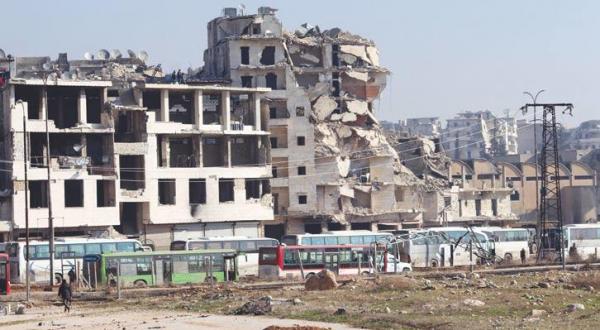The Middle East after Aleppo
Khattar Abu Diab/The Arab Weekly/December 25/16
While Russian President Vladimir Putin gains in power, US President Barack Obama is getting ready to leave White House.
The outlook of the Middle East shifts with the changing conditions in Syria and Iraq. With the fall of Aleppo, the crises in Syria and the region cross into a phase laden with questions: Will Russia and Iran continue to cooperate in defining Syria’s future? How will Donald Trump’s administration in the United States react to emerging Russian dominance in parts of the Middle East? How will other players in the region, namely Turkey, Israel and Saudi Arabia, react? Do European powers have a role to play in the Middle East a century after the Sykes-Picot agreement?
The fall of eastern Aleppo would not have been possible were it not for the combination of the United States abandoning the Syrian revolutionary movement following the September 2013 chemical weapons deal with Russia, Turkey turning to Russia, Arab countries lacking unity and Europe being weak.
While Russian President Vladimir Putin gains in power, US President Barack Obama is getting ready to leave the White House dragging behind him the weight of the disaster in Syria and his overall measly performance in foreign policy. He simply abandoned the region for a strategic breach by Russia and Iran’s expansionism.
He abandoned Aleppo to its fate without a word. He was like Judas, especially when Syrian President Bashar Assad tried to secure a victory in Aleppo, even though he played only a secondary role, while Iran was boasting about “divine victories”.
This new Middle East is a sanctuary for chaos that started with the destruction of Iraq in 2003. It has become a laboratory for a Russia eager to avenge its humiliation after losing the Cold War. It is also a growth zone for wars among Muslims as Arab countries are ripped apart, Israel remains safe and the Kurds impose themselves as major regional players.
Russia failed to prevent Islamic State (ISIS) forces from retaking the strategic and historical town of Palmyra. Borders and entities in Syria continue to shift depending on the whims of US-Russian coordination, or lack of it, in the so-called war on terrorism.
UN Envoy for Syria Staffan de Mistura is waiting for the battle for Idlib to definitely unfold while evacuation operations from eastern Aleppo face difficulties. On the ground, the two major players — Russia and Iran — are still in disagreement. Most likely, the situation will shift in accordance with the Russian vision. The coordination meeting between Russia, Turkey and Iran on December 27th will be a chance to discover Putin’s orientations and priorities.
Tehran and Damascus might prefer to carry the military momentum towards Douma, Homs, Daraa and Idlib but this may not suit Russian intentions. It is quite plausible that Putin will stop at the victory in Aleppo and use it in negotiations with Trump.
It is clear that Aleppo’s fall will not put an end to the suffering of the Syrian people in the absence of a realistic political solution. Russia needs to learn from the situation in Iraq, where armed conflicts have continued to rage since the US-led invasion of 2003 and where both the United States and Iran failed to establish a fair and representative system of government.
On a wider scale, the dawn of a new stable Middle East cannot rise on the basis of injustice, hegemony, intolerance and extremism. It must be built on compromise, citizenship and acceptance of the other. For that to happen, the region must cease to be used as playground of the major regional and world powers to the detriment of its peoples and their civilisations.























